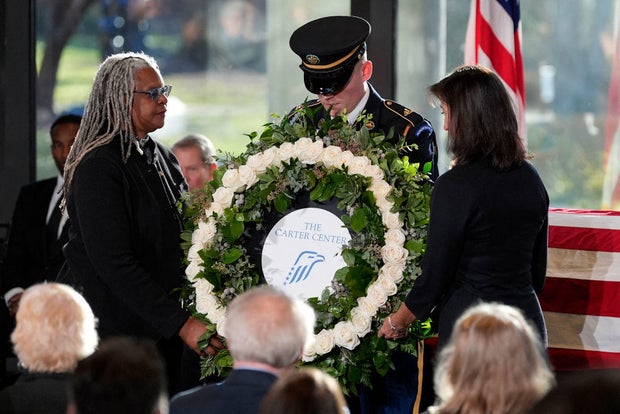A look at the life and impact of Jimmy Carter
Atlanta — Dr. Meredith Evans was just 4 years old when she wrote a letter to President Jimmy Carter.
“Dear Jimmy Carter…here’s some money to help you be president,” Evans wrote at the time, sending a dollar and a penny.
Evans eventually got her money back and much more. She now serves as director of the Carter Presidential Library and Museum in Atlanta, Georgia, where a memorial service was held for the late president Saturday as part of his six-day state funeral following his death last weekend at the age of 100.
“When I met President Carter for the first time, I told him about the letter, we both laughed about it,” Evans told CBS News.

Evans says Carter’s compassion and authenticity are woven throughout the museum, starting with his childhood in the rural farm communities of Plains and nearby Archery.
“It was an African American community,” Evans said of Plains. “I don’t think it was until Plains that he realized how difficult segregation was for people of color.”
It was the people of Plains who helped catapult the small-town peanut farmer to the governorship of Georgia and ultimately the White House. Evans said Carter overcame the lack of name recognition to win the presidency.
“Nobody had any idea,” Evans said of Carter in the early portion of both races. “And some of the campaign videos talk about Carter who? Who’s that? And then there’s this conversation about who he is and what he stands for.”
Carter defeated President Gerald Ford in 1976, putting his own stamp on the inauguration when he became the first president to get out of the limo and walk at his Inaugural Parade.
“He was the first to get out of the car,” Evans said. “And I thought, look at this — he’s a trailblazer and didn’t even realize he was a trailblazer.”
The museum highlights the Camp David Accords in which Carter negotiated a peace agreement between the leaders of Israel and Egypt in 1978.
“I would argue, it is probably one of the greatest things he ever did,” Evans said. “He brought two arch enemies together and had a treaty signed. Not many presidents can say they did that.”
But Carter’s presidency was mired with controversies, from record inflation to the Iran hostage crisis, ultimately sealing his defeat against President Ronald Reagan. The 39th president went on to establish the Carter Center, focusing on humanitarian work, which earned him the Nobel Peace Prize in 2002.
According to Evans, Carter received the Nobel with “joy and humility.”
“He doesn’t see himself better than anyone.”
Nikole Killion is a CBS News congressional correspondent based in Washington D.C. As a correspondent, Killion played a key role in the Network’s 2020 political and election coverage, reporting from around the country during the final stretch of the campaign and throughout the Biden transition.



